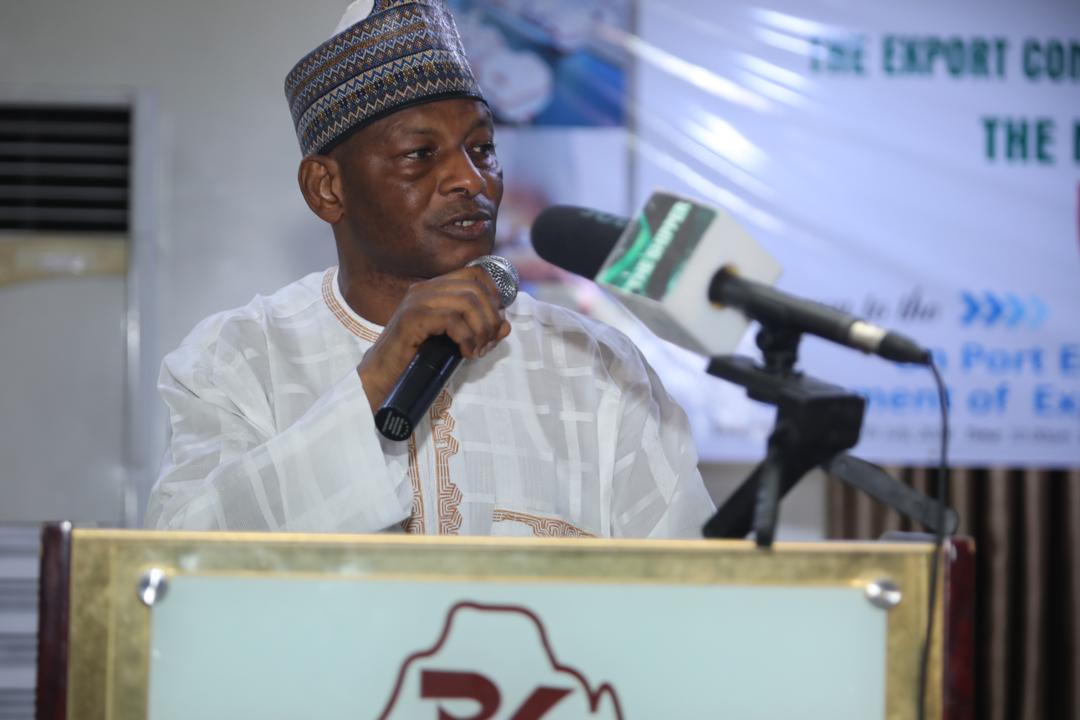By Abba Collins
The Nigeria Shippers Council, in collaboration with the Export Commodities Coordinating Committee (ECCC), has organized a one-day stakeholders workshop on Wednesday in Lagos with the theme ‘Port Economic Regulation and Its Impact on Shipment of Export Commodities through Nigerian Ports’.
The one-day event was attended by the Permanent Secretary of the Federal Ministry of Industry, Trade, and Investment, Amb. Nura Rimi, who highlighted the essential role of Nigerian ports in elevating the nation’s export efficiency and competitiveness.
The Director of Commodities and Export Department Ministry of Trade and Investment, Kaura Irimiya, who was representing Rimi, pointed out the extensive wealth of exportable commodities in Nigeria, which include oil, gas, and agricultural products, and emphasized the importance of efficient port operations in driving economic growth.
According to him, “Our economic growth and international competitiveness are dependent on our ability to export these commodities efficiently”.
He posited that that ports must operate at their peak capacity to ensure a smooth flow of exports
He said “Our ability to efficiently export these commodities is crucial for our economic growth and international competitiveness,” he stated.
However, he noted that the smooth flow of exports heavily relies on ports functioning at their optimal capacity.
He stated that the Export Commodities Coordinating Committee (ECCC), established in 1988, had a crucial part to play in organizing the workshop.
According to him, the ECCC was created to address the challenges that the Structural Adjustment Programme (SAP) introduced, which led to the privatization of state-owned industries and the abolition of commodity marketing boards.
He explained that this led to problems like adultery and low-quality export commodities from Nigeria, and the country’s growing financial obligations to International Commodity Organizations.
He emphasized the importance of ensuring that Nigeria’s export trade meets international standards and fulfills financial obligations to international bodies. By bringing together stakeholders from different sectors to discuss the impact of port economic regulation on non-oil export commodities, Rimi highlighted the need for a collaborative effort to create a regulatory framework that empowers exporters and streamlines processes.
Rimi called for brainstorming solutions, sharing best practices, and creating a roadmap for a more efficient and competitive commodity export sector in Nigeria. This workshop was seen as a crucial step in achieving these goals and unlocking the full potential of Nigeria’s commodity export sector.
In his welcome address, the Executive Secretary/CEO of the Nigerian Shippers Council, Pius Akutah, highlighted the NSC’s efforts to address these challenges through various initiatives such as the establishment of an electronic truck call-up system at the ports, collaboration with relevant stakeholders to improve port infrastructure, and advocacy for the reduction of cargo handling charges.
He emphasized the importance of collaboration between the government, private sector, and other stakeholders to address these challenges and improve the competitiveness of Nigeria’s exports.
Akutah further reiterated the NSC’s commitment to working towards a more efficient and competitive port sector that would benefit both shippers and the economy as a whole. He called for continued support and cooperation from all stakeholders to achieve this goal.
Also speaking at the event, Mr. Glory Onojedo, Director of Consumer Affairs at the NSC, stressed the importance of collaboration between stakeholders such as government agencies, port operators, freight forwarders, and shippers to address these challenges collectively.
He expressed confidence that through such collaboration, the Nigerian ports can become more efficient and competitive, leading to increased exports.
PHOTO: Director Commodities and Export Department, Ministry of Trade and Investment, Kaura Irimiya, representative of the Permanent Secretary of the Federal Ministry of Industry, Trade, and Investment, Amb. Nura Rimi,





